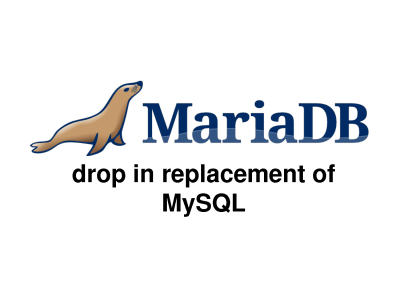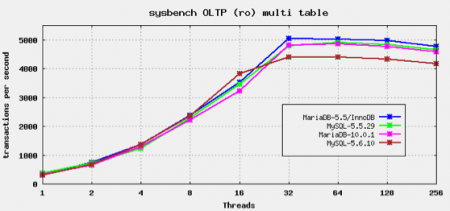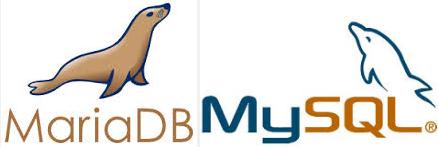MariaDB กำลังจะมาแทน MySQL

http://www.unixmen.com/10-easy-steps-to-upgrade-from-mysql-to-mariadb-on-centos-6-4/
หลัง Oracle ซื้อ MySQL การพัฒนาที่เคยเป็นไปอย่างต่อเนื่องในฐานะ Open Source ก็เปลี่ยนไป ด้วยท่าทีของการเป็นผู้ทำธุรกิจซอฟท์แวร์ ฝั่งนักพัฒนาทั่วโลกเห็นท่าไม่ค่อยดีก็เริ่มทะยอยย้ายฐานไป MariaDB เพราะเรื่องนี้ผู้พัฒนาเลือกได้ และมีเวลาเลือกซะด้วย

+ http://slashdot.org/topic/bi/mariadb-vs-mysql-a-comparison/
+ http://blog.mariadb.org/mysql-man-pages-silently-relicensed-away-from-gpl/
+ http://fedoraproject.org/wiki/Features/ReplaceMySQLwithMariaDB
+ http://www.admin-magazine.com/Articles/MariaDB-vs.-MySQL
+ https://mariadb.org/
+ http://dev.mysql.com/
Oracle is killing MySQL
by Nick Farrell
The founder of MySQL Michael Widenius “Monty” claims that Oracle is killing off his MySQL database and he is recommending that people move to his new project MariaDB. In an interview with Muktware Widenius said his MariaDB, which is also open source, its on track to replacing MySQL at WikiMedia and other major organizations and companies.
He said MySQL was widely popular long before MySQL was bought by Sun because it was free and had good support. There was a rule that anyone should get MySQL up and running in 15 minutes. Widenius was concerned about MySQL’s sale to Oracle and has been watching as the popularity of MySQL has been declining. He said that Oracle was making a number of mistakes. Firstly new ‘enterprise’ extensions in MySQL were closed source, the bugs database is not public, and the MySQL public repositories are not anymore actively updated.
Widenius said that security problems were not communicated nor addressed quickly and instead of fixing bugs, Oracle is removing features. It is not all bad. Some of the new code is surprisingly good by Oracle, but unfortunately the quality varies and a notable part needs to be rewritten before we can include it in things like MariaDB. Widenius said that it’s impossible for the community to work with the MySQL developers at Oracle as it doesn’t accept patches, does not have a public roadmap and there was no way to discuss with MySQL developers how to implement things or how the current code works.
Basically Oracle has made the project less open and the beast has tanked, while at the same time more open versions of the code, such as MariaDB are rising in popularity.
Oracle Makes More Moves To Kill Open Source MySQL
by Alex Williams
18 ส.ค.55 Oracle is holding back test cases in the latest release of MySQL. It’s a move that has all the markings of the company’s continued efforts to further close up the open source software and alienate the MySQL developer community.
The issue stems back to a recent discovery that the latest MySQL release has bug fixes but without a single one having any test cases associated with it. That creates all sorts of problems for developers who have no assurance that the problem is actually fixed.
It’s pretty clear that Oracle is trying to make it as difficult as possible to use MySQL. The result is a wave of unsettlement in the developer community about what Oracle considers open and what it sees as closed. The move is causing problems for developers in all manner of ways as expressed here and here.
MySQL is the popular database used by developers throughout the world. Oracle gained control of the software distribution when it acquired Sun Microsystems in 2010.
According to a post on MariaDB, MySQL has used a testing framework called mysql-test since 1999. Over the years tests have been built for new features and regression tests that guarantee that a bug fix is permanent. Developers such as those from Facebook and Twitter rely on the testing framework. At Twitter, MySQL serves as the “persistent storage technology behind most Twitter data: the interest graph, timelines, user data and the Tweets themselves.”
It also appears that Oracle pulled the revision history for MySQL. The revision history groups changes to the millions of lines of source code into what are known as change sets. A change set shows the changes for a particular feature. It shows who made the bug fix, when and why. By removing the revision history, Oracle will keep developers guessing about what is fixed and what is not.
For observers, these moves do not look like simple oversights. More so, it appears that Oracle is making its revision tests and histories closed source. It’s not so surprising knowing Oracle and its history.
But it does raise questions for the open source community about what to do as seen in the comments on Hacker News.
I like what one commenter said about the issue. Forget Oracle. It really is time to move on.
http://techcrunch.com/2012/08/18/oracle-makes-more-moves-to-kill-open-source-mysql/
Why Oracle Won’t Kill MySQL
by Victoria Barret, Forbes Staff
It’s tempting to speculate that Oracle ‘s bid for Sun Microsystems is a convenient way to kill off open-source database wonder, MySQL. But MySQL’s former chief executive, Mårten Mickos, sees things differently. If anything, Oracle badly wanted MySQL.
The reason: Microsoft .
Oracle Chief Larry Ellison Larry Ellison might become a friend of open source, after all, if it helps him get at his long-time enemy, Microsoft. Sun acquired MySQL last year for $1 billion. Oracle was rumored to also be a bidder. How sweet, then to get MySQL a year later in a cheap deal for a slew of other businesses. (Oracle is paying $5.6 billion for Sun excluding its cash and debt piles.)
Mickos talked with Forbes on Monday after the Oracle-Sun deal was announced.
Forbes: What’s your initial reaction to the news that Oracle wants to acquire Sun?
Marten Mickos: It’s amazing, and not entirely surprising. Oracle has the money and is a long-term, strategic player. They went into applications to compete with SAP and have successfully done this. Now they want to out-compete Microsoft.
Microsoft’s database business is the fastest growing. Oracle can use MySQL to achieve a stronger developer community.
But doesn’t that risk cannibalizing Oracle’s database business?
MySQL is growing like crazy. That hasn’t hurt Oracle. MySQL works for Web-based applications. Oracle is for older, legacy applications. Oracle might as well cannibalize themselves, then have someone else do it.
You don’t think they’ll just kill the business? They’ve let Siebel’s online efforts languish and could do the same here.
They can kill the business. But I don’t think they will. Larry Ellison is smart. MySQL was getting around 70,000 downloads a day when I left. It’s an amazing grip on young developers. Having MySQL makes business sense for Oracle.
How will this deal impact MySQL’s community of developers? One might say they’re now working for “the man.”
Any popular open-source project has multiple communities. They don’t care who owns it. They care whether it works. There’s a vocal minority that will say a lot about this. But MySQL has an installed base of 12 million. You and I pay attention to this stuff, but lots of developers probably don’t even know MySQL is owned by Sun.
InnoDB (an open-source technology that Oracle acquired in 2005) is still very popular. It’s run surprisingly autonomously. That’s really the issue. Will Oracle run MySQL separately, or try to merge it with other groups? They could mess it up.
How?
By slipping it into the database division. Then you’ll see turf wars. The power of MySQL is its openness. Oracle is different. They don’t have their bug database public, for example. You risk losing the philosophy of MySQL and its edge in the market.
Or, there’s a risk they give it away as a freebie. One of MySQL’s strengths is that it has a business model.
But my belief is that Oracle’s executives understand this.
So were Larry’s anti-open source rants all bravado?
Yes, of course. I think he loves open source. I am just speculating, but he is an outside-of-the-box thinker. And it will allow him to compete creatively with Microsoft, his favorite enemy.
http://www.forbes.com/2009/04/20/mysql-marten-mickos-technology-enterprise-tech-mysql.html
